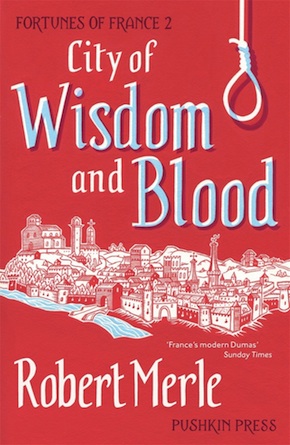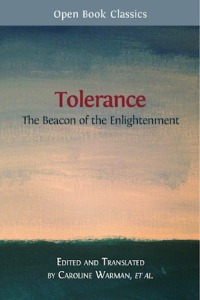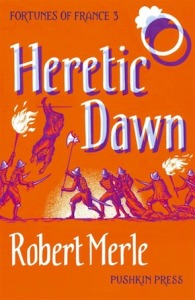Centuries of wisdom and blood
by Mika Provata-Carlone
“Historical fiction at its very best.” We Love This Book
France and the world were stunned by shock and horror at the beginning and end of 2015 when terrorist fundamentalists spread fear and murder across Paris. Hunting down the culprits, locating their networks and above all untangling and striving to understand their motives and ultimate purpose has become a daily agenda, with ramifications far beyond our time.
From a practical point of view, we must examine the present, the current dynamics and possible solutions, resolutions, protective and reconstructive measures. Yet in order to transcend the moment and prevent its recurrence in the future, we need the human stories. We need the history of France in relation to internal or external divisions, the history of philosophical tolerance and intolerance, we need to confront both ourselves and the other in our midst. Factual history can often be misleading, creating objective critical distances that make us lose focus of the drama of humanity, as can annalistic accounts of social development and experience. Odd as it may seem, historical novels that respect facts and relish storytelling, together with the records of the thought process of the most outstanding minds are perhaps the better guides to some sense of good and evil.
Taking its cue from the thunderous invocation of the Enlightenment, its thinkers and its principles that characterised France’s intellectual and moral response to the tragedy of the Charlie Hebdo attack, this harrowing violation of every principle of humanity, Oxford’s French department has reacted by publishing Tolerance: The Beacon of the Enlightenment, a uniquely ambitious and richly engaging collection of 18th-century essays in translation under the editorial leadership of Professor Caroline Warman. The unequivocal message of the wisdom of Voltaire, Diderot, de Condorcet, Locke, Montesquieu, Beaumarchais, l’Abbé Grégoire, Kant, Rousseau, Bernardin de Saint-Pierre, Lessing and Marmontel (as well as Frederick of Prussia and several others) is that we have been morally lost and humanly intolerant, intellectually confused and politically stranded for a very long time. Their trenchant essays and gripping treatises are cries of despair as well as spectacular displays of force – the force of what they perceived as the light to guide humanity out of its darkness. Warman’s introduction is as unflinchingly poignant, tracing the genealogy of evil and bigotry, advocating sharp insight, historical consciousness and an unambiguous commitment to a better present and future. Warman has produced a book full of impassioned ideas, a thinking book to stir and move, provoke and stimulate.
To understand the course that led to the Enlightenment is perhaps a way to a more critical understanding of our own ‘century of violence’.”
 What she also stresses is that the Enlightenment was not an isolated phenomenon, a distinct movement of change and transformation, certainly not a self-contained, self-sufficient historical moment. It proceeded from a venal, troubled past of strife, the pursuit of wisdom and human dignity and the shedding of much blood, just as it precedes our own tumultuous, modern barbaric times. To understand the course that led to the Enlightenment is perhaps a way to a more critical understanding of our own state of what Warman calls our “century of violence” in an explicit identification of the age of Voltaire with the age of Al-Qaeda and IS.
What she also stresses is that the Enlightenment was not an isolated phenomenon, a distinct movement of change and transformation, certainly not a self-contained, self-sufficient historical moment. It proceeded from a venal, troubled past of strife, the pursuit of wisdom and human dignity and the shedding of much blood, just as it precedes our own tumultuous, modern barbaric times. To understand the course that led to the Enlightenment is perhaps a way to a more critical understanding of our own state of what Warman calls our “century of violence” in an explicit identification of the age of Voltaire with the age of Al-Qaeda and IS.
Robert Merle’s multi-volume saga ‘Fortunes of France’, covering the stormy years of 1547–1666, provides breathtakingly, gloriously, with high drama and titillating intrigue the background of all that will come after. This is the time of the religious wars between Catholic aristocracy and the rising Protestant middle classes, a time when individualism is pitted against feudalism, new scientific methods against an insularly understood religious doctrine. Freedom of speech, viperous irony and critique, and fundamentalist militantism are in a constant tug of war on both sides, a war with a toll of four million lives between 1562 and 1598 according to certain sources. Before Voltaire, there are Rabelais, Montaigne, Spinoza, Descartes, there are kings and merchants, Christians of every shade and Jews of every hue, as well as atheists, agnostics, rebels and villains. Across Europe, there is a tempest of iconoclastic fury, the beeldenstorm, there are massacres perpetrated by all factions, with one common victim: human life and hope. Robert Merle’s astonishing series chronicling these times has finally found an English home in Pushkin Press, with two volumes already in print and a third on the way. Brethren, published in September 2014, was an unqualified success, and City of Wisdom and Blood, published a year later is a sumptuously plump second installment of this bildungsroman of France through the trepidations, ambitions and day-to-day experiences of a single family, that of Baron de Siorac. Merle weaves an intricate tapestry of personal and public moments of being, relishing every detail (the fruit of long hours in libraries and archives) and the enthrallment of conjuring up the past through intimate imagery and language. In the original French, Merle succeeds in recreating a 16th-century vernacular (combining the langue d’oc and Provençal) that would be still intelligible, and highly alluring, to readers today. He also offers an almost instinctive survey map of France, an intuitive tour of landscapes, cities, heritage and promised future.
 City of Wisdom and Blood is a novel full of great belligerent barons, who are “better at bartering than fighting”, buxom maidens or ladies of a certain age and status yearning for love and lore, heroes and anti-heroes who are “crude but not cruel”. This is a very visual, sensory book, full of smells and textures, hues and colours, “torrid heat” and icy cold, a story drenched in wine and rain, soaked in tears, occasionally, and blood, frequently. It has gentle priests and abbots, even more not-so-Catholic confessions and dearly bought indulgences. This is a vernacular book – both in terms of language and in terms of lives: every detail, intake of breath and dusty gallop is there, together with sighs of repentance, pain, languid longing or fervent lust. History unfolds boldly, as do landscapes and the everyday habits and customs of the mighty and the low. Bodices heaving and corpses dangling from trees are abundant in equal measure, to remind us that this was not only the era of Rabelaisian gusto and Cartesian reason, but also a particularly and unashamedly barbaric one, a time when any charitable action seems to be but “a small balm” on the doer’s conscience, rather than capable of bringing about any change in human attitudes and conditions.
City of Wisdom and Blood is a novel full of great belligerent barons, who are “better at bartering than fighting”, buxom maidens or ladies of a certain age and status yearning for love and lore, heroes and anti-heroes who are “crude but not cruel”. This is a very visual, sensory book, full of smells and textures, hues and colours, “torrid heat” and icy cold, a story drenched in wine and rain, soaked in tears, occasionally, and blood, frequently. It has gentle priests and abbots, even more not-so-Catholic confessions and dearly bought indulgences. This is a vernacular book – both in terms of language and in terms of lives: every detail, intake of breath and dusty gallop is there, together with sighs of repentance, pain, languid longing or fervent lust. History unfolds boldly, as do landscapes and the everyday habits and customs of the mighty and the low. Bodices heaving and corpses dangling from trees are abundant in equal measure, to remind us that this was not only the era of Rabelaisian gusto and Cartesian reason, but also a particularly and unashamedly barbaric one, a time when any charitable action seems to be but “a small balm” on the doer’s conscience, rather than capable of bringing about any change in human attitudes and conditions.
Merle inserts a fine weft of historical particulars, especially about science and the efforts to combine (or replace) faith with rational analysis, as natural history and science blend well with political intrigue and love entanglements. His pre-Enlightenment figures amusingly defy superstition and the fear of hell and damnation by asserting the supremacy of a still hesitant or foolhardily confident scientific process – in medicine, astronomy, the earth sciences or chemistry. Their stance is often accompanied by a good pinch of safety measures, a pater noster or two to cover every eventuality, a dash of astrology and alchemy and a good dollop of mysticism and pretended scientific omniscience. Through a ribald narrative of youthful adventures and historical turmoil, Merle addresses the question of whether evil is part of good, or sin part of virtue, whether there is knowledge and wisdom beyond reason, logic and philosophy. He also grants their place in history to groups not always acknowledged in the chronicles and contemporary annals. Sephardic Jews are prominent in The City of Wisdom and Blood, bringing with them the medical knowledge of their own tradition, of the Arabs and of the Greeks, as this had been assimilated into Arab philosophy and science. They are the gentle, idiosyncratically generous and faithful doppelgänger of the persecuted Huguenots, the men cast as hedonists, flamboyant show-offs, quaint and implicitly close-fisted, the women mystical, of entrancing (and forbidden) beauty. The equilibrium between stereotype and balanced vision is a precarious one oftentimes, not only for Jews but for women as well in Merle’s universe, where the vision is rather evocative of 007 as far as the female of the species is concerned.
 This is Dumas (a comparison often made by critics) inspired by Rabelais and retold by Zola, with zest, bawdiness, raw emotion, irreverence and several intertwining agendas. There is a hefty dose of Henry Fielding and certainly of Louis Pergaud’s superb La Guerre des Boutons (1912) for two-thirds of the novel, until the strands of imminent tragedy and drama that will lead to the massacre of Saint Bartholomew’s Day come together in the gory carnage of the Michelade massacre, this time of Catholics by Huguenots. The great dilemma, which perhaps will be answered in the third novel of the series Heretic Dawn (published on 4 February), is arguably at the crux of the Paris atrocities as well as the religious wars of 16th- to17th-century France and certainly Voltaire’s enlightened Candide: when you denounce nonsense, how does one also avoid denouncing common sense? This is the final cry of the Gargantuan atheist Abbot Cabassus who will burn at the stake: denying everything is the ultimate act of freedom in a world bereft of reason and sentiment, faith or hope.
This is Dumas (a comparison often made by critics) inspired by Rabelais and retold by Zola, with zest, bawdiness, raw emotion, irreverence and several intertwining agendas. There is a hefty dose of Henry Fielding and certainly of Louis Pergaud’s superb La Guerre des Boutons (1912) for two-thirds of the novel, until the strands of imminent tragedy and drama that will lead to the massacre of Saint Bartholomew’s Day come together in the gory carnage of the Michelade massacre, this time of Catholics by Huguenots. The great dilemma, which perhaps will be answered in the third novel of the series Heretic Dawn (published on 4 February), is arguably at the crux of the Paris atrocities as well as the religious wars of 16th- to17th-century France and certainly Voltaire’s enlightened Candide: when you denounce nonsense, how does one also avoid denouncing common sense? This is the final cry of the Gargantuan atheist Abbot Cabassus who will burn at the stake: denying everything is the ultimate act of freedom in a world bereft of reason and sentiment, faith or hope.
The City of Wisdom and Blood is a novel where the conventions of “Reader, I married him” are deliciously and tantalisingly observed, but with more muscle and male complicity –perhaps one could say that this is an exemplary specimen of ‘chaps’ lit’ to counter or complement ‘chick lit’. It is certainly a fine companion piece to Warman’s Tolerance, both individually and as part of the Fortunes of France series, and a powerfully accessible path of introspection and questioning of the present through the past.
Tolerance: The Beacon of the Enlightenment, edited by Caroline Warman, is published by Open Book Publishers in various formats, including a free pdf download. Read more.
Robert Merle’s Brethren, The City of Wisdom and Blood and Heretic Dawn are published or forthcoming from Pushkin Press. Read more.
Mika Provata-Carlone is an independent scholar, translator, editor and illustrator, and a contributing editor to Bookanista. She has a doctorate from Princeton University and lives and works in London.

